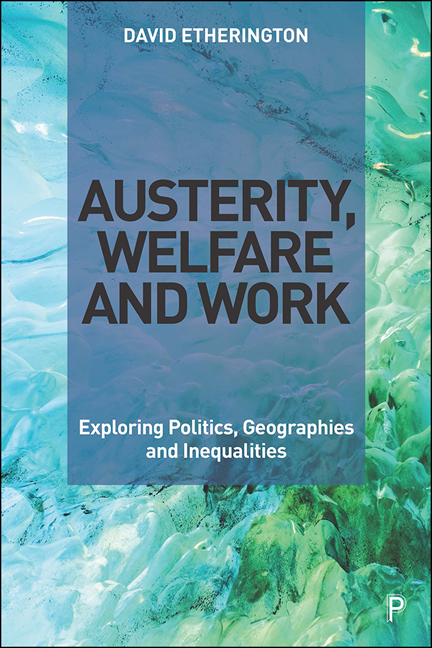Book contents
- Frontmatter
- Dedication
- Contents
- List of Tables and Box
- List of Abbreviations
- Notes on the Author
- Acknowledgements
- Preface
- 1 Introduction: the Crisis and Austerity Neoliberalism
- 2 Conceptualising Austerity, Welfare and Employment Relations
- 3 Embedding Neoliberal Austerity: from New Labour to the Conservative Government
- 4 Resisting Welfare Reforms and Work-First Policies
- 5 ‘Devolving’ Welfare Policies in Greater Manchester’s Precarious Economy
- 6 Challenging Welfare Conditionality and Insecure Work
- 7 Towards a more Inclusive Labour Market: Lessons from Denmark
- 8 Conclusions: Progressive Alternatives to Austerity
- Notes
- References
- Index
6 - Challenging Welfare Conditionality and Insecure Work
Published online by Cambridge University Press: 10 March 2021
- Frontmatter
- Dedication
- Contents
- List of Tables and Box
- List of Abbreviations
- Notes on the Author
- Acknowledgements
- Preface
- 1 Introduction: the Crisis and Austerity Neoliberalism
- 2 Conceptualising Austerity, Welfare and Employment Relations
- 3 Embedding Neoliberal Austerity: from New Labour to the Conservative Government
- 4 Resisting Welfare Reforms and Work-First Policies
- 5 ‘Devolving’ Welfare Policies in Greater Manchester’s Precarious Economy
- 6 Challenging Welfare Conditionality and Insecure Work
- 7 Towards a more Inclusive Labour Market: Lessons from Denmark
- 8 Conclusions: Progressive Alternatives to Austerity
- Notes
- References
- Index
Summary
… workfare seeks to maximize rates of employment by eroding benefits packages and activating transitions into work, … and it explicitly socializes welfare recipients for unstable, contingent jobs, reconciling (in a downward direction) the needs and aspirations of welfare recipients in accordance with the realities of low wage in local labour markets. Second, the generation of administrative pressures to enter the first available job self-evidently erodes the capacity of labour to wait for more favourable employment opportunities, while intensifying competition for entrylevel positions. Third, it effectively market-tests access to residual welfare services, rationing these services according to the criterion of employability. (Peck, 2002: 332, 347)
‘The airwaves should be full of outrage … It's labour you can turn on and off like a tap’, says Loach, ‘It follows on from Daniel Blake because while researching the film we were struck in the foodbank that a number of the people were working, and when we were in the benefits office, most (claimants) were working. The idea of the working poor loomed large in our conversation.’ (Ken Loach, interviewed by Aditya Chakrabortty, 2019)
Introduction
Chapter 3 described how Universal Credit (UC) and the social security system help to impose discipline on reserve labour by ensuring that there are strict rules for eligibility including the requirement to accept work offers. Contemporary moves towards ‘workfare’ can be seen as a further development in the process of managing the reserve army of labour. Instead of – or in addition to – the relatively passive approach implied in the notion of social security, workfare seems to promise a more active management of the labour market. It builds on the disciplinary aspects of social security adapting labour to fit more closely with the specific needs of particular industrial sectors or local employers (Grover, 2012). The previous chapter on Greater Manchester demonstrated how the welfare reform agenda has had major impacts on the Greater Manchester economy, leading to a more precarious and insecure labour market. Since the 2008 financial crisis there has been an increase in labour market inequalities with a rise in low-paid and precarious work which is integrally connected to austerity/neoliberalism as a strategy of disciplining labour (Umney, 2018).
- Type
- Chapter
- Information
- Austerity, Welfare and WorkExploring Politics, Geographies and Inequalities, pp. 115 - 132Publisher: Bristol University PressPrint publication year: 2020



